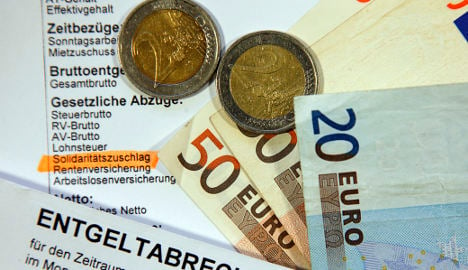In one of the more surprising ideas being thrown about, Schäuble stunned his senior colleagues by suggesting raising the Soli surcharge from the present 5.5 percent of a worker’s income tax to 8 percent, the Financial Times Deutschland reported Thursday.
The solidarity surcharge was set up nearly 20 years ago to pay for the revival of the moribund former communist eastern states. In recent years there have been growing calls to scrap it altogether.
But in the midst of Germany’s worst modern budget crisis, all ideas are on the table as the government prepares to squeeze savings and boost revenue wherever it can. other ideas include a hike in tobacco tax, a new fuel tax for electricity generated by nuclear power could be introduced, and a surcharge on airline tickets.
This week the three party heads of the centre-right coalition, Chancellor Angela Merkel, Foreign Minister Guido Westerwelle and Bavarian premier Horst Seehofer met in the Chancellery to discuss an upcoming cabinet meeting on Sunday, where ministers will thrash out the necessary savings that need to be made to the overstretched federal budget, the FTD reported.
Seehofer and Westerwelle were appalled, both having promised tax cuts at the last election, the paper reported.
As the government searches high and low for savings, other ideas being discussed include cuts to Elterngeld, the payments to new parents who want to take time off work after the birth of their child, expected to save €200 million per year.
There is also a reported plan to delay the €550 million Berliner Stadtschloss construction project, which was due to begin in 2011.
Also under consideration is an extension of the autobahn charge on goods vehicles such as trucks, which is called the LKW-Maut. Under the toll, introduced in 2005 as a way of charging foreign freight vehicles for using German motorways, the average truck pays about 15 cents per kilometre.
The government had previously promised not to raise the toll in this legislative session, but on Thursday Transport Minister Peter Ramsauer told the Hamburger Abendblatt that it was still on the table. He added, however, that a similar toll on passenger cars was not being considered.
Good and services that currently enjoy a reduced sales tax or VAT could lose their special status. Even the recently-reduced sales tax on hotel stays could be reversed.
Nor will Germany’s armed forces escape the budget razor. There have been suggestions that Defence Minister Karl-Theodor zu Guttenberg is looking to reduce the number of soldiers from about 250,000 to 150,000 and abolish compulsory military service – a move that could save €400,000 million a year.



 Please whitelist us to continue reading.
Please whitelist us to continue reading.
Member comments